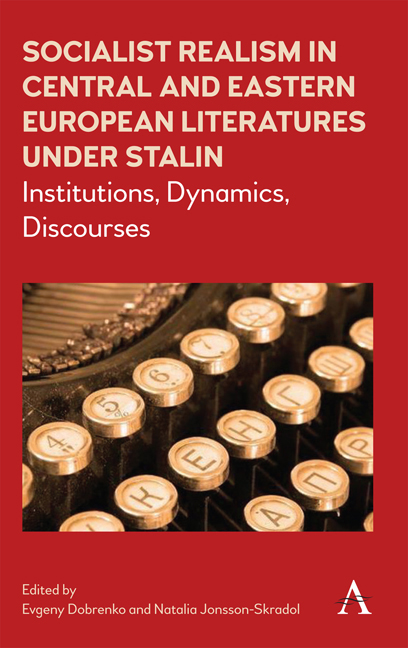 Socialist Realism in Central and Eastern European Literatures under Stalin
Socialist Realism in Central and Eastern European Literatures under Stalin Book contents
- Frontmatter
- Contents
- Acknowledgements
- Introduction
- Part 1 Institutions
- 1 How Socialist Realism Was Exported to Eastern European Countries and How They Got Rid of It
- 2 Literary Monopolists and the Forging of the Post–World War II People's Republic of Letters
- 3 Once Dr Faul Has Left: The Agony of Socialist Realism in Poland, 1955–56
- 4 From Literature Censored by Poets to Literature Censored by the Party: Censorship in the Czech Literary Culture of 1945–55
- 5 The Demise of ‘Socialist Realism for Export’ in 1947: VOKS Receives John Steinbeck and Robert Capa
- 6 The Soviet Factor and the Institutionalization of Bulgarian Literature after World War II
- 7 Cultural Renewal in Eastern Germany – Mission Impossible for Soviet Cultural Officers and German Anti-Fascists?
- Part 2 Dynamics
- Part 3 Discourses
- Conclusion
- List of Contributors
- Index
7 - Cultural Renewal in Eastern Germany – Mission Impossible for Soviet Cultural Officers and German Anti-Fascists?
from Part 1 - Institutions
Published online by Cambridge University Press: 10 May 2018
- Frontmatter
- Contents
- Acknowledgements
- Introduction
- Part 1 Institutions
- 1 How Socialist Realism Was Exported to Eastern European Countries and How They Got Rid of It
- 2 Literary Monopolists and the Forging of the Post–World War II People's Republic of Letters
- 3 Once Dr Faul Has Left: The Agony of Socialist Realism in Poland, 1955–56
- 4 From Literature Censored by Poets to Literature Censored by the Party: Censorship in the Czech Literary Culture of 1945–55
- 5 The Demise of ‘Socialist Realism for Export’ in 1947: VOKS Receives John Steinbeck and Robert Capa
- 6 The Soviet Factor and the Institutionalization of Bulgarian Literature after World War II
- 7 Cultural Renewal in Eastern Germany – Mission Impossible for Soviet Cultural Officers and German Anti-Fascists?
- Part 2 Dynamics
- Part 3 Discourses
- Conclusion
- List of Contributors
- Index
Summary
Among the Ruins
In May 1945, Marshal Georgii Zhukov declared: ‘We have stormed Berlin, but we have yet to conquer the Germans’ souls’. His prophecy that the conquerors would achieve ‘a glorious victory […] on this front as well’ was, however, not to be fulfilled. The legacy of Nazi propaganda, a fear of revenge, a disavowal of their crimes and guilt, the violence of the advancing Red Army, the constant threat of robbery and plunder, the shock of defeat – all of this led most Germans to reject Soviet governance. Many efforts of the Soviet Military Administration (SMAD) to restore supply chains and daily life were barely acknowledged. In the Allies’ contest for the Germans’ sympathy, the Soviets were at a disadvantage from the very start, particularly in comparison to the Americans.
However, in one domain the Soviet administration was unquestionably ahead of the Westerners. Thanks to the enthusiasm of its cultural officers, the eastern part of Germany, and especially Berlin, experienced a cultural revitalization that became almost legendary. Within the shortest time, theatres and cinemas were reopened, the first radio broadcasts recommenced, concerts and exhibitions were organized and books were published, despite, or perhaps as a reaction towards the reigning desolation and apathy. Seeing themselves as ‘archaeologists’ of a kind, the cultural officers proceeded to excavate a culture that had been buried under the rubble of the Nazi dictatorship and to breathe new life into it. They procured venues, heating materials and special provisions, competed with the other occupying powers for the best music and theatre performances, courted famous intellectuals in exile and searched – equipped with a ‘list of the masters of German culture – for missing artists. It was a time of enthusiasm and longing for the new, where open critique and international contacts were still possible.
Especially well- known were Sergei Tiul'panov, head of the Administration for Propaganda and Censorship of the SMAD (renamed Administration for Information in 1947) and Aleksandr Dymshits, head of the Culture Department under the former, but also music expert Sergei Barskii, theatre consultant Il'ia Fradkin and Aleksandr Kirsanov, editor- in- chief of the SMAD newspaper Tägliche Rundschau. The journalist Hans Borgelt describes Dymshits as an ‘enthusiastic professor of the arts and the actual initiator of post- war cultural activity in Berlin’, and thereby one of those ‘chiefly responsible for making the years of hunger golden’.
- Type
- Chapter
- Information
- Socialist Realism in Central and Eastern European Literatures under StalinInstitutions, Dynamics, Discourses, pp. 101 - 114Publisher: Anthem PressPrint publication year: 2018


